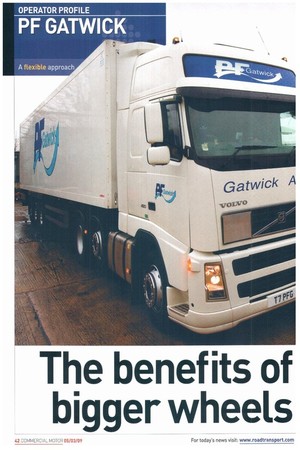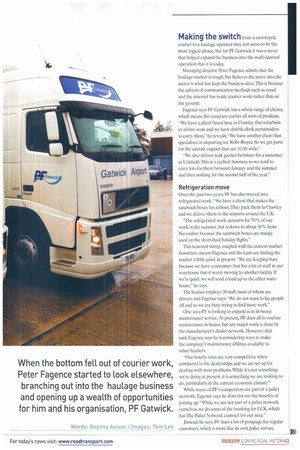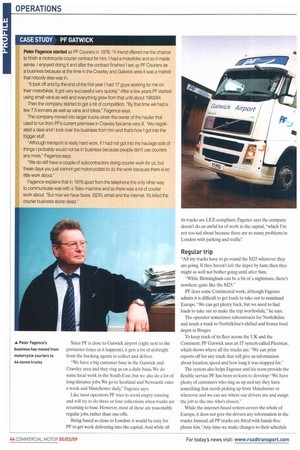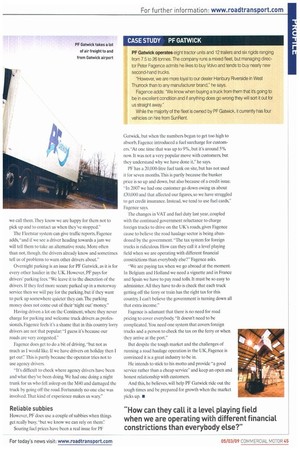The benefits of
Page 42

Page 43

Page 44

Page 45

If you've noticed an error in this article please click here to report it so we can fix it.
bigger wheels
When the bottom fell out of courier work, Peter Fagence started to look elsewhere, branching out into the haulage business and opening up a wealth of opportunities for him and his organisation, PF Gatwick.
Words: Roanna Avison / Imayes: Tom Lee Making the switch from a motorcycle courier to a haulage operator may not seem to be the most logical choice, but for PF Gatwick it was a move that helped expand the business into the multi-faceted operation that it is today.
Managing director Peter Fagence admits that the haulage market is tough, but believes the move into the sector is what has kept the business alive. This is because the advent of communication methods such as email and the internet has made courier work rather thin on the ground.
Fagence says PF Gatwick has a whole range of clients, which means the company carries all sorts of products. "We have a client based here in Crawley that refurbishes airline seats and we have double-deck curtainsiders to carry them,'' he reveals. "We have another client that specialises in importing for Rolls-Royce. So we get parts for the aircraft engines that are 10.5ft wide."
"We also deliver teak garden furniture for a customer in Uckfield.This is a cyclical business, so we tend to carry lots for them between January and the summer and then nothing for the second half of the year."
Refrigeration move
Over the past two years. PF has also moved into refrigerated work. "We have a client that makes the sandwich boxes for airlines.They pack them in Crawley and we deliver them to the airports around the UK.
"The refrigerated work accounts for 70% of our work in the summer, but is down to about 30% from November because the sandwich boxes are mainly used on the short-haul holiday flights."
This seasonal slump, coupled with the current market downturn, means Fagence and his team are finding the market a little quiet at present. "We are keeping busy because we have a customer that has a lot of stuff in our warehouse that it wants moving to another facility. If we're quiet, we will send a load up to the other warehouse," he says.
The haulier employs 20 staff, most of whom are drivers, and Fagence says: "We do not want to lay people off and so we are busy trying to find more work."
One area PF is looking to expand is its in-house maintenance service. At present, PF does all its routine maintenance in-house, hut any major work is done by the manufacturer's dealer network. However, that said, Fagence says he is considering ways to make the company's maintenance abilities available to other hauliers.
"Our hourly rates are very competitive when compared to the dealerships, and we are set up for dealing with most problems.While it's not something we're doing at present, it is something we are looking to do, particularly in the current economic climate."
While many of PF's competitors are part of a pallet network. Fagence says he does not see the benefits of joining up. "While we are not part of a pallet network ourselves, we do some of the trunking for LCK, which has The Pallet Network contract for our area."
Instead, he says. PF does a lot of groupage for regular customers, which is more like its own pallet service.
Since PF is close to Gatwick airport (right next to the perimeter fence as it happens), it gets a lot of airfreight from the booking agents to collect and deliver.
"We have a big customer base in the Gatwick and Crawley area and they ring us on a daily basis. We do some local work in the South-East, but we also do a lot of long-distance jobs. We go to Scotland and Newcastle once a week and Manchester daily," Fagence says, Like most operators PF tries to avoid empty running and will try to do three or four collections when trucks are returning to base. However, most of these are reasonably regular jobs, rather than one-offs.
Being based so close to London, it would be easy for PF to get work delivering into the capital. And while all its trucks are LEZ-compliant, Fagence says the company doesn't do an awful lot of work in the capital, "which I'm not too sad about because there are so many problems in London with parking and traffic':
Regular trip
"All my trucks have to go round the M25 wherever they are going. If they haven't left the depot by 6am, then they might as well not bother going until after 9am.
"While Birmingham can be a bit of a nightmare, there's nowhere quite like the M25."
PF does some Continental work, although Fagence admits it is difficult to get loads to take out to mainland Europe. "We can get plenty back, but we need to find loads to take out to make the trip worthwhile," he says.
The operator sometimes subcontracts for Noifolkline and sends a truck to Norfolkline's chilled and frozen food depot in Bruges.
To keep track of its fleet across the UK and the Continent, PF Gatwick uses an IT system called Fleetstar, which shows where all the trucks are. "We can print reports off for any truck that will give us information about location, speed and how long it was stopped for."
The system also helps Fagence and his team provide the flexible service PF has been so keen to develop: "We have plenty of customers who ring us up and say they have something that needs picking up from Manchester or wherever and we can see where our drivers are and assign the job to the one who's closest."
While the intemet-based system covers the whole of Europe, it does not give the drivers any information in the trucks. Instead, all PF trucks are fitted with hands-free phone kits. "Any time we make changes to their schedule we call them. They know we are happy for them not to pick up and to contact us when they've stopped."
The Fleetstar system can give traffic reports. Fagence adds, "and if we see a driver heading towards a jam we will tell them to take an alternative route. More often than not, though, the drivers already know and sometimes tell us of problems to warn other drivers about."
Overnight parking is an issue for PF Gatwick, as it is for every other haulier in the UK. However, PF pays for drivers' parking fees. "We leave it to the discretion of the drivers. If they feel more secure parked up in a motorway service then we will pay for the parking, but if they want to park up somewhere quieter they can The parking money does not come out of their 'night out' money."
Having driven a lot on the Continent, where they never charge for parking and welcome truck drivers as professionals, Fagence feels it's a shame that in this country ion-y drivers are not that popular: "I guess it's because our roads are very congested."
Fagence does get to do a bit of driving, "but not as much as I would like. If we have drivers on holiday then I get out': This is partly because the operator tries not to use agency drivers.
"It's difficult to check where agency drivers have been and what they've been doing. We had one doing a night trunk for us who fell asleep on the M40 and damaged the truck by going off the road. Fortunately no one else was involved.That kind of experience makes us wary."
Reliable subbies
However, PF does use a couple of subbies when things get really busy, "hut we know we can rely on them': Soaring fuel prices have been a real issue for PF Gatwick, but when the numbers began to get too high to absorb, Fagence introduced a fuel surcharge for customers."At one time that was up to 9%, but it's around 5% now. It was not a very popular move with customers, but they understand why we have done it," he says.
PF has a 20,000-litre fuel tank on site, but has not used it for seven months. This is partly because the bunker price is so up and down. hut also because of a credit issue. -In 2007 we had one customer go down owing us about 130,000 and that affected our figures, so we have struggled to get credit insurance. Instead, we tend to use fuel cards," Fagence says.
The changes in VAT and fuel duty last year, coupled with the continued government reluctance to charge foreign trucks to drive on the UK's roads, gives Fagence cause to believe the road haulage sector is being abandoned by the government. "The tax system for foreign trucks is ridiculous. How can they call it a level playing field when we are operating with different financial constrictions than everybody else?" Fagence asks.
''We are paying tax when we go abroad at the moment. In Belgium and Holland we need a vignette and in France and Spain we have to pay road tolls. It must be so easy to administer. All they have to do is check that each truck getting off the ferry or train has the right tax for this country. I can't believe the government is turning down all that extra income."
Fagence is adamant that there is no need for road pricing to cover everybody. "It doesn't need to be complicated. You need one system that covers foreign trucks and a person to check the tax on the ferry or when they arrive at the port."
But despite the tough market and the challenges of running a road haulage operation in the UK, Fagence is convinced it is a great industry to be in.
He intends to stick to his motto and provide "a good service rather than a cheap service" and keep an open and honest relationship with customers.
And this, he believes, will help PF Gatwick ride out the tough times and be prepared for growth when the market picks up. •
















































































































































